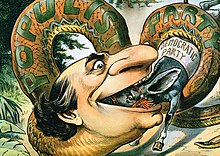Populism
Populism is a name for a kind of political movement. Populists usually try to make a difference between common people and "elites" (meaning usually, top classes of people). Populists may think of wealthy people or well-educated people as belonging to the class of elites. Populists may also call those who have been working in government for a long time "establishment" and count them as elites too. A theme of populism is that the common people lack certain privileges that the elites have, or that commoners cannot do certain things the elites can do. The populists see themselves on the side of the common people. They want to help the common people get some of the rights and privileges of the elites.



Right-wing populism
changeRight-wing populists take some of the values of right-wing parties:
- They see unregulated immigration as good for the elite and bad for the people.
- They are against globalization and foreign beliefs: In Europe, they often think that European values are based on Christian ones, and that other religions or their values are bad.
Left-wing populism
changeLeft-wing populists share some of the values of left-wing parties:
- They believe in social justice, according to their defined definition
- Often, they are against capitalism and globalization
- Unlike right-wing populists who are against unregulated immigration, they focus heavily on including unprivileged social groups. Often at the burden of a larger collective.
Left-wing populism is common in Central and South America.